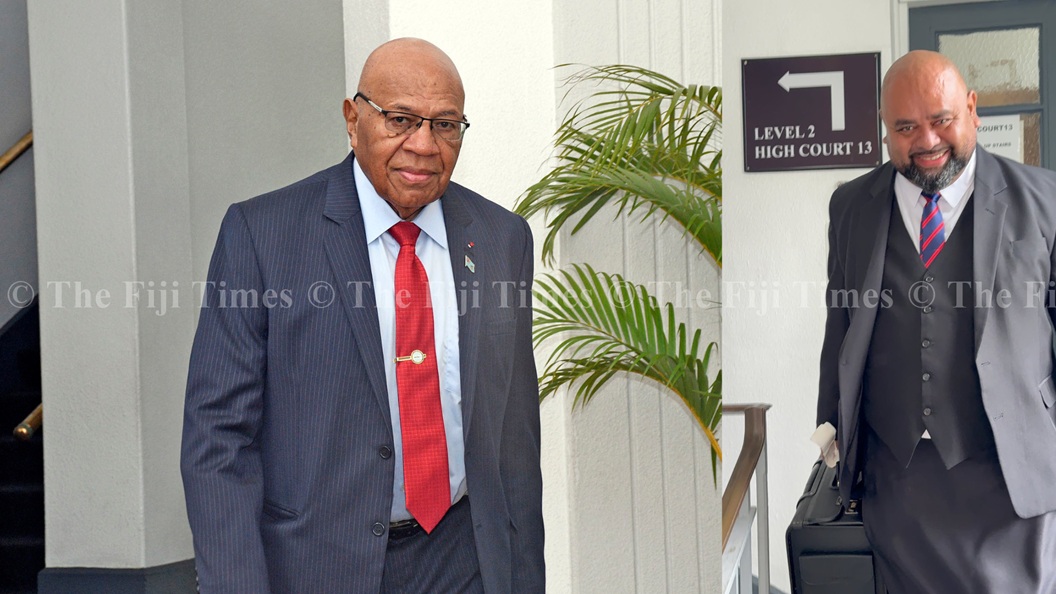When Prime Minister Sitiveni Rabuka advised the President to revoke the appointment of Fiji’s former anti-corruption chief, Barbara Malimali, it was a decisive move taken in the middle of a governance crisis.
To him, the choice was not political theatre. It was an attempt to safeguard the integrity of a system built to hold power to account. Now in the High Court, that decision is under scrutiny.
The Prime Minister’s lawyer, Simione Valenitabua, argued it was not only lawful but necessary to maintain public trust in one of the country’s key watchdogs.
In submissions filed as Second Respondent in this judicial review case, Mr Valenitabua sets out a defence built on constitutional responsibility, executive authority and the urgent need to preserve the independence of Fiji’s fight against corruption.
Mr Valenitabua argues that the Prime Minister acted out of constitutional duty to protect the integrity of Fiji’s anti-corruption framework when he advised the President to revoke Ms Malimali’s appointment.
He told the High Court the decision was not only lawful, but required, to prevent a collapse of public confidence in a key watchdog institution.
He argued the Prime Minister stepped in only after the Judicial Services Commission became unable to perform its role. It followed the Commission of Inquiry’s findings which had raised concerns about the JSC’s own conduct.
Mr Valenitabua told the court the JSC had become “constitutionally paralysed” and could not perform its statutory functions. A majority of its members were said to be implicated in irregularities that the Commission of Inquiry was established to investigate.
He submitted that “a body in which a majority of members are adjudged to be conflicted in a matter cannot impartially adjudicate upon that same matter.” Keeping the usual process in place would, in his view, create “a constitutional absurdity”.
The submission states the Prime Minister did not overstep his powers, because the President acts on ministerial advice when exercising executive authority. The only way to remedy an institutional deadlock was through Section 82 of the Constitution.
Mr Valenitabua submitted that “the Prime Minister’s advice was not an implied assumption of the JSC’s role, but the necessary exercise of a separate, inherent executive power to remedy a constitutional deadlock”.
He maintained this action respected the separation of powers because the Prime Minister did not attempt to take on any judicial functions.
Instead, the submissions state he activated a constitutional default process to keep the State functioning.
The submissions stressed that a recommendation was not the same as advice the President must follow. The JSC may “recommend” appointments under the Act but this, he argued, “is not a word of compulsion”. The President’s authority to appoint and revoke rests with executive powers drawn from the Constitution, exercised only on proper advice.
The submission warns that refusing the Prime Minister’s involvement would mean “that once appointed, no matter how flawed the appointment process, a Commissioner could never be removed except for post-appointment misconduct under Section 112 – an absurd result that would permanently entrench constitutional defects”.
Mr Valenitabua argued this was never the intent of lawmakers or the Constitution. The power to revoke had to exist to preserve government integrity.
He relied on the common law doctrine of necessity to justify the Prime Minister’s decision.
The document sets out that necessity “does not create a law for itself, but it is the application of a law to a special state of facts”. The “special state of facts” in this case was the breakdown within the JSC.
The submissions say the JSC was conflicted and could not do its job, so the problem could not be fixed from within.
Mr Valenitabua noted the doctrine may be invoked when “there is no constitutional machinery to meet the situation” and to “restore the legal order and the protection of the State”.
The court was told that three conditions for necessity were clearly satisfied. First, there was “a failure of constitutional machinery” because the JSC was paralysed. Second, no alternative existed for restoring order. Third, the Prime Minister acted “solely in the public interest” to safeguard an institution responsible for tackling corruption.
Alongside the constitutional arguments, Mr Valenitabua raised serious concerns about the former Commissioner’s fitness to hold office.
Mr Valenitabua said the Commission of Inquiry had made “damning findings regarding the Applicant’s personal integrity”. He submitted the former Commissioner was “the head of the very institution tasked with prosecuting individuals for the exact same species of dishonesty that she herself had engaged in”.
The submission states she “had engaged in serious professional misconduct in Tuvalu” and was found not to be a “fit and proper person” to practise law there.
It argues she then failed to disclose these issues when applying for the role in Fiji.
Mr Valenitabua said the non-disclosure created a direct conflict because a “pending and live FICAC investigation” involved her. He submitted that this placed her in a role where she would have been required to oversee “an anti-corruption agency that was actively investigating her”.
That put her “a ‘judge in her own cause’ from the very moment she assumed office”.
According to the submission, the Prime Minister was obliged to act to protect public trust in the State.
If he failed to intervene, the Commissioner would have remained in charge of an agency responsible for investigating and prosecuting similar allegations against others.
The court filing concludes that the move was “a proper, rational, and proportionate exercise of constitutional authority”.
It argues the Prime Minister had both the legal right and governance responsibility to ensure that Fiji’s anti-corruption leadership remained credible.
Mr Valenitabua told the court the use of executive power in this case was grounded in Fiji’s constitutional values of good governance and accountability.
The legal decision now rests with the High Court.



